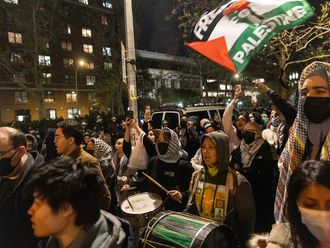In the past few years, the world has witnessed a gradual erosion of American hegemony. American military power is bogged down in two of the world's most ungovernable countries, with no end in sight. While Russian, European and Chinese fortunes are on a slow but steady upward trajectory, America is spinning downward. As a testament to that, the US finds itself helpless in dealing with the Iranian nuclear stand-off. The once compliant Security Council is showing increased signs of independence. And Latin America is a clear example of waning US influence.
Political observers can easily detect a full blown tilt towards the Left in Latin America. There is no doubt about an unmistakable and fundamental shift in the region's politics. Once described as America's backyard by President Harry Truman, Latin America is steering clear of American hegemony. Some may caution that it is too early to draw broad regional conclusions about a huge area driven by many disparate political forces, but there is no denying the increasingly leftist tilt of Central and South American politics.
Take Chile and Bolivia, for instance. In Chile, a paediatrician, Michelle Bachelet, won the elections after defeating the right-wing Sebastian Disera, thus becoming the first woman president of the country. A moderate socialist, she campaigned on a platform of continuing Chile's free market policies, while increasing social benefits to help reduce the gap between rich and poor.
In Bolivia, the country's president-elect Evo Morales became the first indigenous person to be elected to the top job in the country's history. He is a former labour leader, an ally of Venezuelan President Hugo Chavez and a long-time leftist. During his campaign, Morales threatened to nationalise foreign oil companies in Bolivia, something he did in the first few months of his tenure.
In Venezuela, Chavez heads Latin America's best known leftist government. The presidency of Chavez has survived a coup attempt, a nationwide oil strike and a recall referendum. He is widely expected to be re-elected in a vote scheduled for December 2006. Chavez has annoyed and worried and continues to worry the US with his continuing threats to cut off oil exports. The tone of Chavez's rhetoric is avowedly anti-American, accusing the Bush administration of wanting to impose American imperialism on the world. Chavez's close ties with Cuban leader Fidel Castro hardly endear him to Washington.
Already in power
A leftist is ahead in the polls in Mexico, where presidential elections are scheduled for July. Left-leaning leaders are already in power in Brazil, Argentina and Uruguay. Peru and Nicaragua could also see their governments take a Left turn in elections set for later 2006. In Peru, Ollanta Humala, a nationalist former military officer backed by Chavez and Morales, came from behind to force a run off in April. Some on the Left are quick to declare the recent political victories by leftists as nothing less than a "revolution", a proof that the pendulum had swung in favour of leftist candidates all across the region.
"A wind is blowing to the Left across Latin America," said Mario Alvarez, the head of Mexico's trade union federation. There is a strong and rising trend of anti-Americanism running through some of the countries that are doing the swinging.
The election of Lula da Silva from the Workers party in 2002 in Brazil was the defining moment for the Latin American Left. The example of Brazil boosted the confidence of the Left in South America and laid the foundations for the new Left. Chile and Argentina have left-of-centre governments. The centre-right government of Dela Rua in Argentina was unable to continue amidst popular uprising caused by the socio-economic crisis. His government lasted only two years.
Leftists have come to power riding the wave of anti-neoliberalism. In the 1980s and 1990s South American countries opened up their economies, undertook privatisation and followed the dictates advised by Washington. Argentina went to the extreme of privatising its petroleum industry. But these measures have not helped solve the socio economic crisis but instead exacerbated them. The voters were disenchanted with the neo-liberal reforms that boomeranged and wanted to give a chance to the Left.
The rise to power of the Left has shifted power equations. Governments attach great importance to collective strength through formation and strengthening of regional groups and agreements. These governments are trying to reduce their dependence on North America and diversify their trade partners. The emergence of the Left has coincided with the entry of South American markets by China.
Chinese exports to Latin America in 2003 were $17 billion, 10 times the exports of India. China is the second largest trading partner of Chile. The Bush administration now promises to wage a battle for the future of Latin America, but with few options left except of course the military one and it is unclear if that will have any more success in what used to be America's backyard than it is having now in the Middle East.
Latin America teems with hundreds of thousands of Palestinians. They have maintained emotional and cultural ties to their homeland and have supported it with remittances and investment. The Left has traditionally maintained a more balanced position towards the Palestinian cause. Chavez has criticised the international squeeze on the Palestinians since Hamas took power. He was quoted as saying "like the rest of the international community, we [Venezuelans] recognise the legitimacy of the Palestinian [National]Authority and are in favour of a state for the Palestinians". This is the position of other Left-leaning governments in Latin America. Palestinians stand to gain much from this trend.
- Professor As'ad Abdul Rahman is the Chairman of the Palestinian Encyclopedia.









